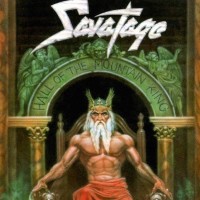If you thought Jon Oliva’s debut solo album would sound like Savatage or Jon Oliva’s Pain, you’ll be disabused of that notion right from the top. The album opens with the title track, which sounds like nothing you’ve ever heard from the Mountain King before. The largely instrumental five-minute track plays on his 1970s prog and Broadway influences. It sounds a bit like a cross between Yes and Queen’s more bombastic moments, with the only vocals being a show-style gang chorus of “Raise the Curtain.”
Considering the album contains the final unreleased music from his late brother and Savatage guitarist Criss Oliva, one would expect connections to the sound of that band, and they’re here, but not completely obvious. Raise the Curtain, as you can tell from the cover art, is something of a tribute to Criss. The focus of the cover is the piano and microphone, representing Jon center stage, then off to the left is the iconic image of Criss’ white Charvel guitar wrapped in roses, which first appeared on the back cover of Savatage’s Gutter Ballet album. Surrounding them are theater curtains with ghostly images from his past.
There are also a lot of eerie parallels involved with this record. In 1993, Criss Oliva died when a drunk driver crossed the center line and hit his car head on. After his brother’s death, Jon Oliva was a bit uncertain of his musical future. He threw himself into the next Savatage record, Handful of Rain, writing and recording most of the music, though he takes only small credit in the liner notes for it. A few short years later, Trans-Siberian Orchestra would begin its rise to fame, ironically scoring its most popular hit with a song originally recorded by Savatage, and the creative forces behind the band, including Oliva, would throw their might behind TSO — leaving Savatage to fade away after a few more albums.
In 2003, Oliva began to write some more metallic music again and formed Jon Oliva’s Pain, which served as sort of a successor to Savatage. Guitarist Matt LaPorte was a huge part of that band’s sound. On April 20, 2011, LaPorte died of a heart attack at the age of 40, leaving Oliva once again wondering what the future of his music and band was. He went on with a 2012 Pain tour to celebrate the 25th anniversary of Savatage’s landmark release Hall of the Mountain King as a tribute to LaPorte, but when he was finished, threw himself into his first solo release.
The result of those efforts features echoes of all of the things that Oliva has done in his career, from the metal stylings of early Savatage to the more symphonic sounds of the band’s later efforts and Trans-Siberian Orchestra to a flavor of Broadway-style show tunes. (Oliva and collaborator Paul O’Neill have written two stage musicals, both scheduled for the TSO treatment in the near future.) But there are many things here that we haven’t heard much of before, the most prominent being that 1970s prog-rock influence that’s largely driven by manic organ riffs, which he liberally drenches the record in.
Once he has the listener fully disoriented with the title track, Oliva launches into the second song “Soul Chaser,” which puts us back in more familiar territory. Though still heavy in a prog sound, there’s a recognizable driving Savatage melody behind it, and Oliva is snarling like his old self. If you dropped some of the bombastic flourishes and put a little more edge on the guitars, you could transform it into a Savatage song easily.
Don’t get too comfortable, though. On the next tune, “Ten Years,” which is one of the best on the record, he breaks out a jazz influence with a horn section. The song rocks with great swagger and cool, and though, as with any Oliva tune, there’s absolutely no mistaking who you’re listening to, it’s something that’s very different from what we’ve heard before.
The centerpiece of the record, though, almost had to be a ballad. While I don’t normally condone ballads, I always look forward to them on an Oliva-written record. Some of my favorite Savatage songs are ballads, and “Believe” from their Streets album ranks as quite possibly my favorite song of all-time. “I Know” carries the soul of Raise the Curtain. It’s a very dark song that will remind listeners of Savatage’s earlier days, and Oliva delivers the verse with that trademark slightly psychotic and sinister lilt that only he is capable of. That changes with the chorus, a soaring and emotional piece that ranks with any that he’s ever done. The song features some very nice lead guitar work, but nothing over the top. It’s very subdued and tasteful, bringing an extra layer of depth to the song. It is Oliva’s best piece of music in a long, long time and worth the price of the album on its own.
Another surprising ballad is “Can’t Get Away,” which finds Oliva in a blues mood early on. Though he still goes for the big power notes and a purely Oliva sound, he also shows a little bit of a soulful growl and a soft and almost tender delivery in places, particularly those that show his Beatles influence.
Fans of his heavier material won’t be disappointed. Though there’s not really a straightforward metal piece to be found, there are some very heavy songs. “Big Brother” blazes with grinding guitars under Oliva’s organ noodlings and swelling symphonic keyboard notes. “Armageddon,” which I expected from the title to be a more metallic piece, is actually a bit more symphonic than I expected, but you can hear that old Savatage feel in it, particularly on the verse, and those big ominous chorus notes are fantastic. “Stalker” brings kind of an exotic guitar flavor to the table before getting – dare I say – a little funky. Oliva delivers the vocals on the song with maniacal, theatrical glee, and it’s one of the more fun songs on the record, despite the disturbing theme of the tune.
Though Raise the Curtain may surprise and raise eyebrows of long-time fans, there is a definite magic here that has been missing for a long time. It doesn’t sound like Savatage, but it has that spirit that, as good as some of their albums have been, Jon Oliva’s Pain has never quite captured. The combination of Jon and Criss Oliva packs a powerful punch that leaves me both exultant and saddened. I’m extremely happy to have the record, but I know also that it’s the last time we’ll hear anything new from the brothers. According to Jon, this is all of it.
Co-writer Dan Fasciano also deserves some credit here, for bringing new things out in Oliva’s music. Those elements don’t always work, but when they do, it’s magic. And while there are songs here, like the title track, that I know I’ll rarely listen to again, there are also some that represent Oliva’s best work in a couple of decades. For that, I’m more than willing to skip a few songs.
The first tastes of Raise the Curtain made me a little nervous, despite my complete and utter fanboy faith in Oliva’s musical genius. But sometimes change is good. In this case, very good. The new flavors and sounds bring a fresh and much-needed energy, and the album is another high note in a stellar career that, aside from TSO, has been sadly overlooked by the masses.
[amazon_enhanced asin=”B00CHEL920″ container=”” container_class=”” price=”All” background_color=”FFFFFF” link_color=”000000″ text_color=”0000FF” /] [amazon_enhanced asin=”B000002ILK” container=”” container_class=”” price=”All” background_color=”FFFFFF” link_color=”000000″ text_color=”0000FF” /] [amazon_enhanced asin=”B002K9RTR6″ container=”” container_class=”” price=”All” background_color=”FFFFFF” link_color=”000000″ text_color=”0000FF” /] [amazon_enhanced asin=”B000002IOH” container=”” container_class=”” price=”All” background_color=”FFFFFF” link_color=”000000″ text_color=”0000FF” /] [amazon_enhanced asin=”B000002IS7″ container=”” container_class=”” price=”All” background_color=”FFFFFF” link_color=”000000″ text_color=”0000FF” /]
- The ‘Sheer Heart Attack’ Song That Confirmed Queen’s Metallic Genius - November 8, 2024
- Blackberry Smoke – ‘Be Right Here’ (2024) - June 10, 2024
- Why That Self-Titled 1994 Album Is the Best Motley Crue You Never Heard - March 18, 2024




